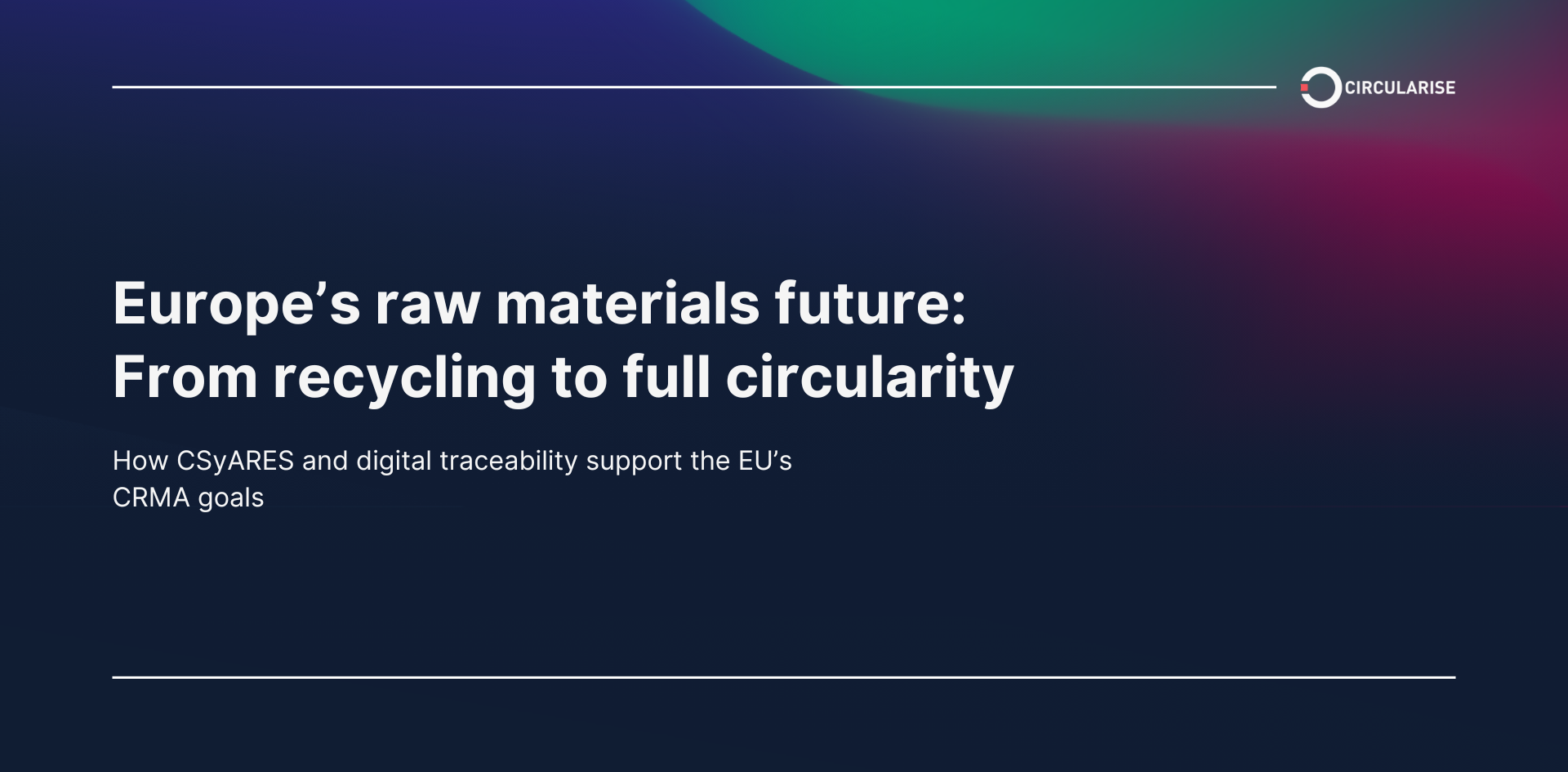Just as your passport contains information about you and where you have been, digital product passports (DPPs) contain detailed information to track products throughout their entire lifecycle, from production to end-of-life disposal. They provide a secure and harmonised way to manage product data, allowing governments, regulators, businesses, and consumers to verify quality, origin, and sustainability credentials. As the global population grows and resources become scarcer, sustainability is becoming a critical priority for regulators around the world. DPPs are becoming essential tools for companies committed to transparency and circularity.
Bioplastics present a particularly compelling case for digital product passports. As these materials gain popularity in packaging, consumer goods, and industrial applications, ensuring their traceability is critical for regulatory compliance and market credibility. DPPs allow companies to verify feedstock origin, assess biodegradability or compostability claims, and track recycling potential. Full visibility over bioplastic supply chains helps companies avoid greenwashing, demonstrate authentic sustainability, and unlock opportunities in low-carbon and circular-economy markets.
In July 2024, the European Union advanced this agenda by adopting the Ecodesign for Sustainable Products Regulation (ESPR) as part of the European Green Deal, marking a significant step toward a circular economy. The regulation requires all businesses operating in the EU to create digital product passports, enabling companies to optimise processes and take responsibility for their production. Beyond regulatory compliance, enhanced supply chain traceability can cut costs, reduce inefficiencies, and foster stronger collaboration among stakeholders. With plastics regulations evolving worldwide, from the EU to emerging global frameworks, companies that adopt robust traceability solutions are better positioned to meet both local and international requirements.
Explore our blog on legislation mandating digital product passports, which provides more details on other related regulations.

Why DPPs matter for bioplastics
For bioplastics, DPPs do more than track material flows — they document sustainability from raw material sourcing through manufacturing, use, and end-of-life processing. This is crucial in a market where claims about biodegradability, compostability, or recycled content are increasingly scrutinised. Accurate and verifiable information supports marketing credibility, regulatory compliance, and investor confidence, while enabling companies to participate in circular economy initiatives and sustainability-focused grants and incentive programs.
How digital product passports work
Building DPPs on public blockchain technology ensures an immutable record of ownership, origin, and usage. The decentralised nature of blockchains makes unauthorised access or data manipulation nearly impossible, providing a reliable way to verify authenticity and quality. The European Commission will also maintain a registry of unique DPP identifiers to store these passports securely.
Applications of DPPs in practice
Information captured in a DPP can be used to:
- Ensure products come from ethical sources and are disposed of responsibly
- Increase efficiency in recycling materials and reduce waste
- Reward stakeholders and customers for sustainable behaviour
- Support the transition toward a circular economy
Creating a DPP step by step
- Identify and collect data: Capture relevant data across the product lifecycle, including raw materials, production, transportation, use, and disposal. For bioplastics, this includes feedstock origin, processing methods, and end-of-life options.
- Analyse and categorise data: Organise data into accessible, secure categories that can be audited and updated.
- Create the digital product passport: Assign a unique product identifier and use software tools, including blockchain solutions, to store and organise data. For bioplastics, this may include chemical composition, certification status, or biodegradability testing results.
- Implement the passport: Integrate the DPP into existing systems and processes. Train stakeholders to ensure proper data collection and use.
- Monitor and analyse: Continuously track and analyse the DPP data to identify issues, optimise supply chains, and reduce environmental impact.
Mass balance for bioplastics
Digital product passports also complement the mass balance approach, which allows companies to allocate recycled or bio-based materials to products even when mixed streams are used. This ensures that the claimed environmental benefits are accurately tracked and reported. Mass balance also enables companies to scale their use of bioplastics without compromising transparency or compliance, providing a clear link between sustainable inputs and end products. Mass balancing can help advance chemical recycling, reducing the amount of virgin feedstock being used.
Sustainability claims based on mass balance data can be securely verified and transparently shared through digital product passports, allowing stakeholders to confidently track the origin, composition, and environmental impact of materials throughout the product lifecycle.
How Circularise can support you
Circularise has helped leading companies implement DPPs and mass balance systems:
- EuReComp Project: Digital product passports for recycled composite materials
- Circular Foam Project: Tracking recycled PU foam across three products and creating DPPs for them
- DOMO: Scalable mass balance implementation using traceability solutions
Conclusion
Creating a digital product passport is complex but increasingly essential, especially for bioplastics. DPPs and mass balance systems allow companies to take responsibility for circularity, improve sustainability claims, and demonstrate leadership in a competitive market. With Circularise, your business can implement these solutions efficiently, protect sensitive data, and gain a strategic advantage in the growing bioplastics and low-carbon markets.
Thankfully, you don’t have to figure out this daunting endeavour on your own. Circularise supports companies towards circularity with our innovative solutions, protecting your data privacy with out patented Smart Questioning solution. Sustainability can be an attainable, yet profitable objective for your business.

Circularise is the leading software platform that provides end-to-end traceability for complex industrial supply chains. We offer two traceability solutions: MassBalancer to automate mass balance bookkeeping and Digital Product Passports for end-to-end batch traceability.
Let Circularise help you with your mass balance accounting and create DPPs to share verifiable data on your sustainability claims.


.png)



